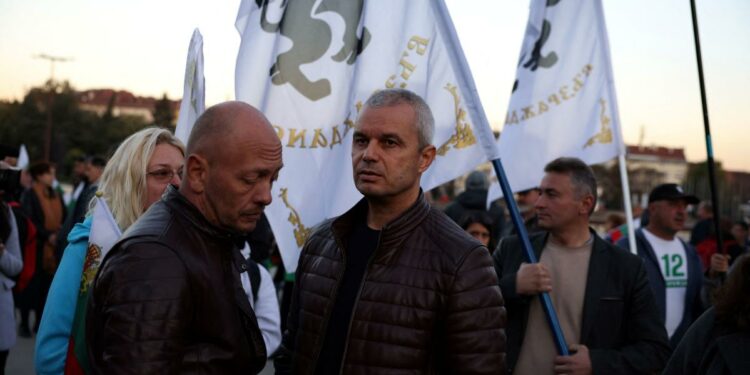Far-right parties are sprouting across Europe — including where they already exist. Within recent years, some countries now have not just one, but two, three, or more visible parties occupying the furthest right space on the political spectrum. The phenomenon has roiled electoral landscapes in some countries, where their proliferation has shifted the governing calculus and led to an overall coarsening of political culture.
Nowhere is this more pronounced than in the Balkans. Bulgaria, over the course of six snap elections held since 2021, has elected 4 different far-right parties to parliament. The largest, “Revival,” advocates for the absorption of North Macedonia, which they claim as part of Bulgarian national heritage. The most recent entrant to the legislature is known as “Morality, Unity and Honour,” and campaigns on a slogan of “Bulgaria First.”
Others have come and gone. “Bulgarian Rise,” founded by a former general, was elected and then ousted in the next election. Likewise for “Greatness,” a pro-Russia party formed by businessman Ivelin Mihailov, which missed the threshold to return to parliament this year by just 25 votes.
Greece is a similar story. The neo-Nazi “Golden Dawn” movement has seen its leaders jailed, but “Spartans,” a movement backed by Golden Dawn figures, managed to win seats in the last election. Other ultranationalist forces have gained ground in recent years. “Greek Solution,” which holds 11 seats in parliament, is led by a controversial businessman known for selling what he claimed were “letters from Jesus.” Polls currently indicate that in the next election, Spartans would lose its seats, while another new far-right party, “Voice of Reason,” would be projected to enter parliament.
It’s not just the Balkans. More than half of countries in the EU, at this point, have at least two nationalist parties with elected representation. By my count, this includes: France, Spain, the Netherlands, Poland, Denmark, Italy, Czechia, Slovakia, Hungary, Croatia, Romania, Latvia, and Lithuania, along with the aforementioned Greece and Bulgaria.
That’s 15 out of 27 EU member states with two or more right-wing nationalist parties who have elected legislators at either the EU or national level.
Brad’s view
While it’s easy to assume that far-right parties are occupying the same political space, they can take different approaches in policy or style, and by extension, build different coalitions. Eric Zemmour, who was sometimes dubbed the “French Tucker Carlson,” gained traction in polls for the last presidential election before a campaign-derailing scandal. He ran with more extreme positions on immigration than Le Pen, but also tacked more towards economic conservatism.
The result was a wealthier support base than Le Pen, who tailors her message to working and middle-class French. A similar divide was observed years ago in the Netherlands, between the “Forum for Democracy” party and Geert Wilders’ “Party for Freedom.”
Elsewhere, the most extreme movements are forcing previously dominant right-wing parties to depend on them for support. To return to government one day, Poland’s “Law and Justice” party may turn towards “Confederation,” an alliance that includes ultranationalists and open antisemites. Even Hungary’s Viktor Orban may find himself in this situation: Polls show his party losing a majority, with a significant share of the vote captured by “Our Homeland,” a movement that has been described as fascist.
Czechia is witnessing the most severe right-wing whiplash. Former prime minister Andrej Babis, who once aligned himself with French president Emmanuel Macron in the European Parliament, has now joined forces with Orban. Polls show the next government could be composed by a coterie of far-right parties, including the AfD-aligned SPD, and “Oath and Motorists,” an alliance led by an ex-racecar driver who once drove in a helmet with Golden Dawn’s logo. Yes, the same neo-Nazi Golden Dawn party mentioned above.
Notable
Ireland is one of the only countries in the EU without a party that aligns itself with the far-right in the European Parliament. But even that might be about to change. The rising “Independent Ireland” party elected an EU legislator earlier this year, who decided to sit with centrists. But the party’s overall character is similar to many anti-immigrant movements in Europe. One Independent Ireland candidate running for national parliament made headlines this week with comments about drug-dealing “coloured guys” that were widely denounced as racist. He initially apologized, but later stood by his remarks.
Source link : http://www.bing.com/news/apiclick.aspx?ref=FexRss&aid=&tid=673967f485004066984dfea38ee7af1c&url=https%3A%2F%2Fwww.yahoo.com%2Fnews%2Feuropes-far-parties-multiplying-fast-172222161.html&c=5205742009862247874&mkt=de-de
Author :
Publish date : 2024-11-15 10:35:00
Copyright for syndicated content belongs to the linked Source.


